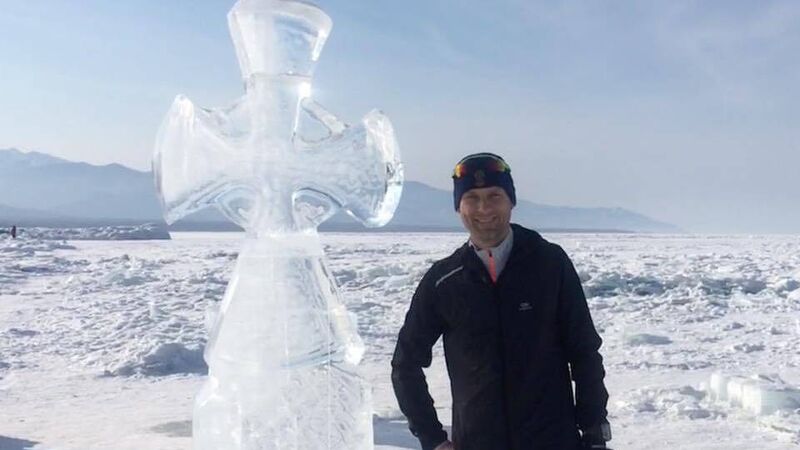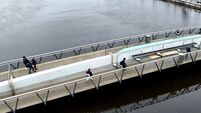'It's going to be a hard slog': Cork firefighter taking part in Arctic Ultramarathon

Alex O'Shea at the Baikal Ice Marathon in southern Siberia.
CORK firefighter and record-holding runner, Alex O’Shea, is set to blaze his next trail through the Swedish Arctic Circle for the annual Arctic Ultramarathon.
The Ballineen man will begin the 230km self-sufficient race tomorrow (February 20), after traveling from Dublin to Stockholm, and from Stockholm to Gallivare, where he and fellow race participants will take a bus north to Swedish Lapland.
Alex, having previously completed a race across Lake Baikal in Russia, is no stranger to running in colder temperatures.
However, the Arctic Ultramarathon is a five-day event that requires participants to live off vac-pack foods and camp overnight in below-freezing conditions, with the lowest temperature drop in the area in 25 years, -43.5°C, recorded in January.
Describing the training and lead-up to the event as less important than the research involved, Alex said he reached out to several different groups for advice ahead of the ultramarathon.
“The training became less important than studying for it, because I know how to run. The running side of it didn’t really bother me, but I wanted to be as prepared as possible and speak to different people.
“You’re drawing on expertise from people that do snowboarding, skiing, and arctic expeditions, so you’re trying to pull the best from all their knowledge.
“You’re looking at people who go mountaineering, that do these races in the mountains and you’re looking at what they pack and how they pack light. What are the essentials that they bring with them and what kind of foods are they working off.”
In addition to speaking with other extreme-sport athletes, Alex had to break in his new running shoes in a creative fashion while preparing for the challenge.
“I had to get a lot of things in advance and try things like the snowshoes. We didn’t get snow in Ireland this year, so I had to take them down to the beach and practice running on soft sand. You have to run with your feet slightly wider because they’re going to hit each other otherwise.”
Alex also touched on the preparations needed for spending the night in harsh weather conditions, and how he plans to maintain his body heat through increased calorie intake.
“The first night we will be in a teepee tent or hunting lodge, where they’ll throw down a reindeer skin and you put your sleeping bag on top. I have a -20°C sleeping bag and it’s meant to keep you comfortable. Then when you add whatever clothing you wear inside.. then that sleeping bag is on top of an air mattress that folds down to the size of a pint glass. So you’re at least two layers above [the ground].
“We’ll be wearing a backpack that’ll have all our food and the organisers will take our sleeping bag and a change of clothes in the morning so that way when you come to the end of the day you know that your sleeping bag and clothes are dry, so you know, if you fall in the snow, you won’t be getting all your stuff wet,” he said.
Alex admitted “it’s going to be a hard slog,” adding “even simple things like my food, and my calories, I’ll be trying to take a lot of calories on board at night time and then again in the morning. I’ll make quite a big breakfast and then when I’m actually out there all day I’ll have some powdered calories in my water.”
Starting the race off with a 65km stint, Alex explained that due to the ever-changing climate in the Swedish Arctic, each day will be different.
“When we arrive, they’ll bring us into a hunting lodge and they’ll go through our clothing and our backpack, make sure we have all our medical kit, all the items they specified. Then I think we’re going to start at about 7 am.
“I had one person that I spoke to, who had done this race before, say to me that if you run the Cork Marathon in three hours, you’re likely to come over here and do the same distance in three times that. You could be looking at nine hours in a day.
“It’s very subjective because every day the conditions could be different, [they] can change within hours. Up until the last minute, they can deviate depending on the weather. There’s one day where we will go across roads and lakes, so there’s obviously safety concerns with that, they’ll have to make sure it’s safe. For example, the lake could crack, so they reserve the right to change a day,” he added.
Alex described the finishing celebrations that are planned for all participants once every runner has passed the finish line.
“They call the last day ‘The Sprint’. It’ll be mostly flat and it’s about 15km long, so they obviously want everyone to get over the line. If the last day was a long day, we’d be so spread out by the time the first person and the last person finished, the gap would be huge.
“There would be no party atmosphere, so it’s best that it’s a really short day because there’s a barbecue and a few drinks afterward.”
Alex, who has previously run in aid of charities such as The Irish Guide Dogs, told The Echo that this journey through the Arctic Circle is “just for me, and my headspace.”
Having started his running journey ten years prior, Alex described running as an outlet that he uses to do his “best thinking.”
Since becoming a father, Alex’s training has become more “family-friendly,” opting to train during school hours or late at night.
“At this stage [running] is an adrenaline rush, you know, it’s my happy space. When I go out training, people say, do you listen to music? And the answer is no, that’s the time where I order the clutter that’s in my head.
“Sometimes you’re just completely in nature listening to the birds and the streams, and that’s nice because we don’t get much of that in our lives, but other times it’s just me sorting out the day.”
Looking to the future, Alex expressed interest in further exploring colder climates and taking his polar pursuits to the next level.
“Going to the arctic is another huge step up for me. The fact that I have to carry my own bag and the fact that it’s a five-day event is, you know, it’s another challenge, maybe I’ll get to the stage where I’ll go and do one of these trips to the South Pole or North Pole. I certainly wouldn’t rule it out.”
Alex highlighted the increase in interest that running has gained in the last number of decades, and encouraged the people of Cork to get involved in this year’s Cork City Marathon, which will be taking place on Saturday, June 2
“Looking at my parent’s generation, the only people that ran back then were serious runners. There was no couch to 5K or fun runner. Like if you saw a running race back then, the only people in that running race were serious club runners.
“There was no other element to it, whereas nowadays running is for everyone, at every level. Some people enjoy just going for a jog, and other people enjoy a more competitive side to it, and we’re always trying to grow Cork Marathon, which is a marathon for everyone.”







 App?
App?


